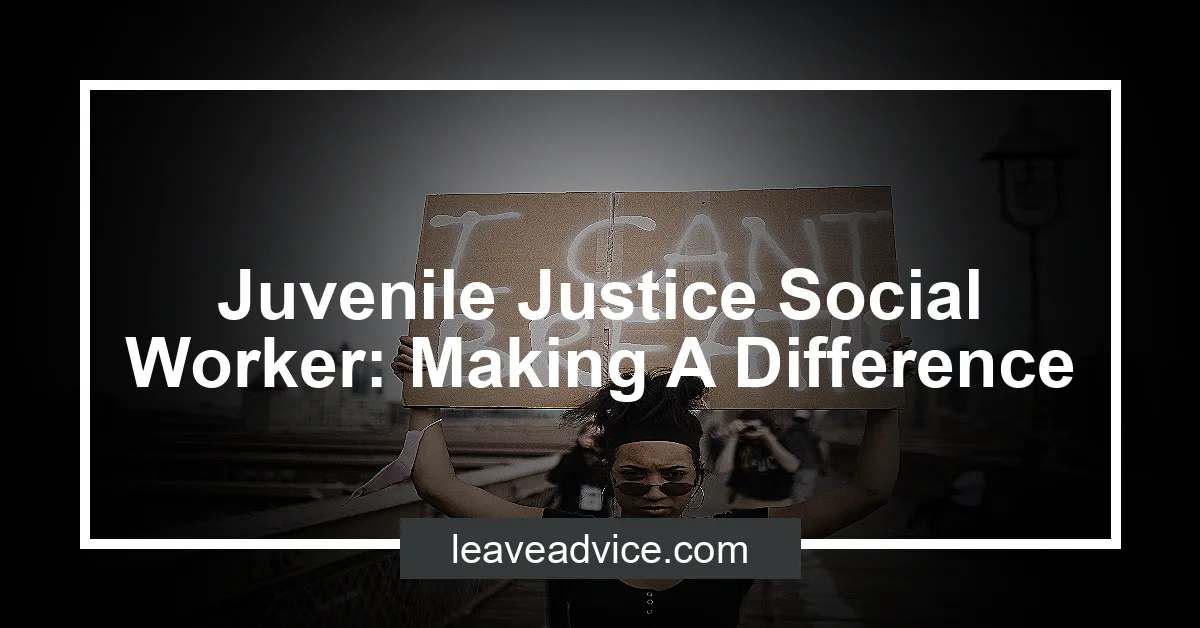Juvenile Justice Social Worker: Making A Difference


Juvenile Justice Social Worker: What Is It and How Does It Work?
A juvenile justice social worker plays a crucial role in the legal system by working with young offenders. This career involves assisting and guiding individuals who are categorized as youth offenders according to the law. The primary responsibilities of a juvenile justice social worker revolve around providing support and intervention to help these young individuals reintegrate into society as law-abiding citizens.
The Role of a Juvenile Justice Social Worker
Juvenile justice social workers are tasked with various duties and responsibilities that are focused on the rehabilitation and well-being of young offenders. These professionals work closely with individuals under the age of 18 who have engaged in criminal behaviors. The goal is to address the underlying issues that contributed to their offenses and help them make positive changes in their lives.
One of the primary responsibilities of a juvenile justice social worker is conducting assessments and evaluations of the young offenders. This involves gathering comprehensive information about their background, family situation, education, behavioral patterns, and any previous encounters with the legal system. By understanding the factors contributing to their delinquent behavior, social workers can develop intervention plans tailored to their specific needs.
Once the assessments are completed, juvenile justice social workers collaborate with other professionals, such as probation officers, counselors, teachers, and psychologists, to create individualized treatment plans for the young offenders. These plans may include educational support, counseling, substance abuse treatment, life skills training, and family therapy. The aim is to address the underlying issues that led to their involvement in criminal activities and provide them with the necessary tools to make positive changes in their lives.
In addition to providing individual counseling and support, juvenile justice social workers also play a critical role in advocating for the rights and needs of young offenders within the legal system. They ensure that the youth receive fair treatment, access to appropriate services, and opportunities for rehabilitation. They may also assist in coordinating court hearings, attending case reviews, and providing testimony on behalf of the young individuals they work with.
Qualifications and Skills of a Juvenile Justice Social Worker
Becoming a juvenile justice social worker requires a combination of education, training, and specific skills. Most positions in this field require at least a bachelor’s degree in social work or a related field. However, some jurisdictions may require a master’s degree for certain roles.
In addition to formal education, individuals pursuing a career as a juvenile justice social worker should possess certain skills and attributes. These include:
-
Empathy and Compassion: Working with young offenders can be challenging, and it requires a deep understanding of the struggles they face. Juvenile justice social workers must be compassionate individuals who can connect with their clients and provide the necessary support and guidance.
-
Strong Communication Skills: Effective communication is vital in this field. Juvenile justice social workers must be able to build rapport with young offenders, communicate effectively with other professionals, and advocate for their clients within the legal system.
-
Problem-Solving and Critical Thinking: Juvenile justice social workers often encounter complex situations that require innovative and strategic problem-solving skills. They must be able to assess the root causes of delinquent behavior and develop evidence-based intervention plans to address them.
-
Cultural Competence: Young offenders come from diverse backgrounds, and it is important for juvenile justice social workers to demonstrate cultural competence. This involves understanding and valuing different cultural perspectives and tailoring interventions to meet the unique needs of each individual.
-
Knowledge of Juvenile Justice Laws and Policies: To effectively support young offenders within the legal system, juvenile justice social workers must have a thorough understanding of juvenile justice laws and policies. This includes knowledge of legal procedures, court processes, and the rights of young individuals.
Juvenile Justice Social Worker Jobs and Employment
The field of juvenile justice social work offers various career opportunities for individuals passionate about making a difference in the lives of young offenders. Job prospects for juvenile justice social workers can be found in various settings, including government agencies, nonprofit organizations, and juvenile correctional facilities.
According to the data from job search websites, there are currently 1554 juvenile justice social worker jobs available. Some of the job titles associated with this field include social worker, youth worker, and youth advocate. These positions provide professionals with the opportunity to directly engage with young individuals and contribute to their rehabilitation and reintegration into society.
For individuals looking for employment in a specific location, such as New York State, there are currently 133 juvenile justice social worker jobs available. These positions offer the chance to work within the local community and support young offenders in their journey towards positive change.
Conclusion
In conclusion, a career as a juvenile justice social worker is a noble and rewarding path for individuals dedicated to helping young offenders rebuild their lives. These professionals play a vital role in the rehabilitation and reintegration process, providing support, guidance, and intervention to address the underlying issues that led to criminal behavior.
When it comes to recommending products related to the field of juvenile justice social work, one standout option is the book “Juvenile Justice: Theory, Practice, and Law” by Larry J. Siegel and Joseph J. Senna. This comprehensive resource provides in-depth insights into the theories, practices, and legal aspects of juvenile justice. It is a valuable tool for professionals and students in this field. You can find the book on Amazon here.


With the guidance and support of dedicated professionals like juvenile justice social workers, young offenders can transform their lives, break the cycle of delinquency, and become valuable members of society.

